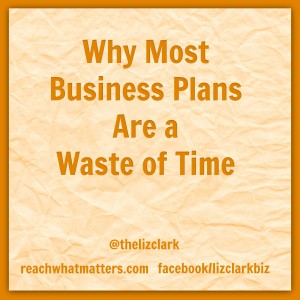
Eleven years ago, I wrote one of the most painful things I’ve ever written.
More painful than the 40+ page research paper on Immanuel Kant I wrote my senior year of college.
More painful than the middle-school, broken-hearted poetry I poured out into my journal after a tragic break-up.
Far more painful. What was it?
A business plan.
It wasn’t painful because I didn’t know what one was.
I had taken a business writing class in college where I learned how to research and write them. I had even written a few for “real” small business owners.
This particular business plan was painful because we were already in business. And it was failing.
We had a few clients and a “promise” of more jobs, but not enough resources to grow without fast cash flow.
As a last resort, we applied for a small business loan from our local bank.
They required a business plan before they would even look at us.
So, I researched. And wrote. And cried. And went through the gamut of emotions: desperation, anger, shame and totally illogical “hope.”
Every section, every word, every financial calculation was like bleeding our very livelihood onto the page.
I believed that the outcome of this loan process would determine whether or not we would be able to “grow” as a business – or force us to close our doors.
Like I said: painful.
We got our meeting with the bank. They were very kind, but ultimately our financial projections weren’t solid enough for them to approve the loan.
In retrospect, I’m glad we were denied. The LAST thing we needed was more debt!
This story is a prime example of when a business plan is a waste of time.
Why?
Because a business plan written just to get a loan or investment is like a teenage kid asking his parents to borrow the “good car.”
All the promises come out: “I’ll be so careful! I’ll do everything right! I have a good record.”
But, the moment that kid gets the keys, he’s going to go back to whatever “normal” habits he has.
If he’s normally a good driver, a responsible kid who makes good decisions, he’ll continue that pattern.
But, if he’s the kid who takes risks, allows his decisions to be influenced by emotion and looks at speed limits as “suggestions,” you’d better believe he’s going to take EXTRA risks with that borrowed gas pedal under his foot.
Banks and good investors know this.
They don’t make decisions on promises. They make decisions based on:
- YOU and your actual habits (financial literacy, credit score, assets)
- Your business’ well-documented feasibility (strategy, market position, market research, projections, leadership ability, etc)
Your turn: Do you see a difference between the two statements below?
- I promise this business is going to make money! I’m a really great person. Everybody likes me!
- This business is strategically positioned to make a sustainable profit over time due to these specific conditions _________________________. <fill in the blank with a clear strategy, solid research and math that makes sense>.
If you had $10,000 to invest, which statement would win your attention? Tell me in the comments!

I’m wondering how many people would actually say #1. Being great with money and likeable would not convince me to invest $10,000 into someone. 😉
So, true, Stephanie! Yet, when I work with people to “get money” that’s exactly the approach they take. People can see clearly it’s not a good approach when it’s phrased like this, but so many business owners take the #1 approach when they try to get an investment. Thanks for commenting!